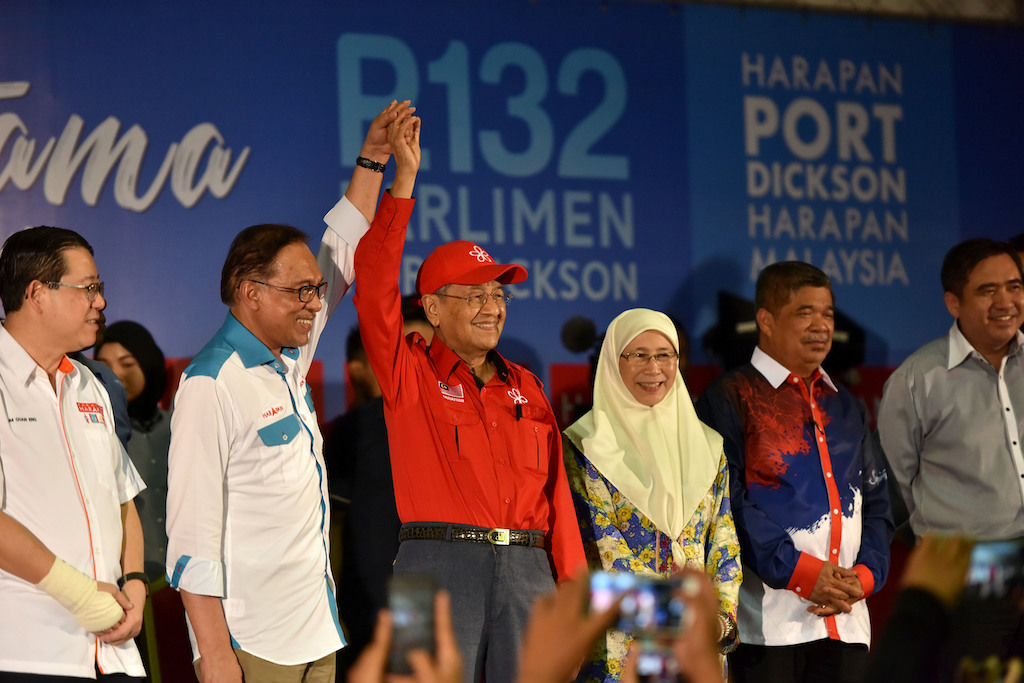Malaysia’s power transition: stormy conditions, steady course
The future of Malaysia’s ruling coalition and its ambitious reforms program hangs on the determination of two iconic leaders, formerly bitter rivals, to set aside their personal grievances and work together for the country’s future. This determination has been put to the test lately.

In a nutshell
- Malaysia’s aged prime minister seems in no hurry to vacate office mid-term, but says we will do it before long
- Other leaders of the ruling coalition have tried to exploit the uncertainty to advance their own political goals
- Foreign investors, impressed as they are with the government’s reform drive, are concerned with the succession issue
On July 16, 2019, a communications advisor to Malaysian Prime Minister Mahathir Mohamad spoke at the launch of a book entitled “Anwar the Eighth Prime Minister.” The advisor, Abdul Kadir Jasin, told the Kuala Lumpur audience that most foreign investors highly praised the reformist agenda of the new Pakatan Harapan (Alliance of Hope, or PH) coalition government led by Mr. Mahathir and backed by Anwar Ibrahim, the charismatic leader of the strongest party in the ruling alliance. The investors, however, did have a concern: would there be a smooth political transition from Mr. Mahathir, the seventh premier, to Mr. Anwar, the “prime minister-in-waiting?”
There was a context to Mr. Kadir Jasin’s message. The incessant speculation among the country’s political elite and chattering classes was casting doubt on the transition because of a history of enmity between the two leaders – and this uncertainty was unhelpful to the economy, claimed the advisor. Writing in his blog two weeks later, the Mahathir loyalist Kadir Jasin shot an arrow in the direction of Azmin Ali, the economics minister, for urging Mr. Mahathir, the current prime minister, to serve a full five-year term. Delaying the mid-term handover of power to Mr. Anwar would violate the preelection pact among the alliance’s leaders.
Ambitious protege
Mr. Azmin’s suggestion was jarring. Firstly, the economics minister who went against the high-level political deal also serves as the deputy president of the People’s Justice Party (PKR), which Mr. Anwar leads. In both his capacities, Minister Azmin was obligated to toe the party and the ruling coalition’s line. Secondly, and even more oddly, his comment was consistent with a similar call by the opposition that was aimed at splitting the ruling PH alliance. So why did Mr. Azmin decide to march out of step with his superior, prime minister-designate Anwar?
The economics minister branded the disclosure as a political ploy.
The answer lurks in the twists and turns of Malaysian politics; to many, the economics minister’s stance was surprising, if not shocking. Perceived as an increasingly ambitious player, Mr. Azmin is engaged in what is essentially a power struggle between a former protege and his mentor – in this case, Mr. Anwar. The battle is potentially destabilizing on three accounts. It threatens to split the PKR, the ruling coalition’s anchor party. Should this occur, the PH government could split and collapse. This would in turn open the way for a return of the Barisan Nasional (National Front, or BN), a grouping of parties representing various ethnic and religious groups which ruled the country since independence from Britain in 1957, winning all general elections until 2018. If the BN returned to power, all the talk about leadership succession from Messrs. Mahathir to Anwar would come to naught.
Enter a sex video
A bombshell coincided with this public souring of the Anwar-Azmin relationship. In June 2019, a young PKR functionary claimed on social media that he and a cabinet minister had been in a gay relationship and released a video clip on YouTube that purportedly showed both of them engaging in sex. The functionary claimed that his partner was Mr. Azmin. The economics minister immediately denied and branded the disclosure as a political ploy to end his career. In Malaysia, same-sex intercourse is criminalized under both civil and Islamic law.
The revelation threw the country into tense anticipation. How would Prime Minister Mahathir and Mr. Anwar, as PKR president and designated successor-leader of the country, respond to the situation? Also, would the law enforcement bodies react, given the alleged crime?
This episode must have felt like deja vu for Mr. Anwar. He was personally subjected to a similar accusation in 1998 when he was Malaysia’s deputy prime minister and finance minister. He, too, dismissed the charge then as the product of an ugly conspiracy, but Mr. Mahathir, then prime minister, used the opportunity to remove Mr. Anwar – with whom he had differences over the economy – and even had him jailed.
The latest controversy over the video is still playing itself out in Malaysia, as some intriguing questions remain unanswered. If not the economics minister, who is the man who resembles him in the clip? Is it possible that Mr. Azmin was trying to deflect public attention from the sex scandal? And why did he call for the sitting prime minister to serve a full term, which meant not stepping down halfway: was it meant to delay, or even derail, Mr. Anwar’s succession of Mr. Mahathir?
Two theories seek to explain the crisis.
Potentially, the scandal could have such an effect. Malaysia’s inspector-general of police made it known that an initial probe by the federal police found the video clip to be authentic, but investigators could not yet verify the identity of the two men, including the one purported to be Mr. Azmin. The police chief was immediately criticized for his haste and taking sides in the controversy. To complicate matters further, Prime Minister Mahathir also prematurely opined that the video affair looked like a conspiracy to him – by someone he did not venture to identify.
For weeks, the sex controversy overshadowed the leadership succession. More recently, however, the leadership transition issue has taken center stage again. Going forward, where is all this going to lead Malaysia?
Scenarios
Scenario 1: Split in the ruling coalition, succession setback
Two competing theories seek to explain the crisis. The first one has Prime Minister Mahathir scheming to push Mr. Anwar out of the succession plan. The assumption is that the prime minister harbors a lingering distrust of Mr. Anwar, carried over from their previous confrontation in the 1990s, which ended with the latter thrown into prison. Some speculate that Mr. Mahathir himself has fed the economics minister’s ambition in the PKR: he gave Mr. Azmin the critical portfolio of economic affairs even though the politician already held the influential post of chief minister of Selangor, the country’s most developed state.
The economics minister’s move to defy the prime minister-designate has been perceived as only the latest manifestation of a rivalry engineered by Prime Minister Mahathir, or his men, to weaken Mr. Anwar and eventually ease him out, or so the theory goes. Finally, both the economics minister and his party’s boss will be pushed out of the power center, making room for other politicians whom Prime Minister Mahathir may have in mind.
Those who doubt the succession plan also point out Mr. Mahathir’s changing deadlines for vacating the office. Initially committed to serving two years, he then started using a softer formula of “more or less two years;” now, he talks of three years. Forces aligned against Mr. Anwar’s rise to the premiership take this as a signal to block his ascendancy, hence the incessant clamoring for Mr. Mahathir to serve a full term instead of stepping aside midway, as agreed in the preelection leadership pact.
On August 4, 2019, as if on the defensive, Minister Azmin declared that he was not opposed to Mr. Anwar becoming the prime minister, after all.
Scenario 2: Mahathir steps down, Anwar takes over
This scenario is kinder to both Mr. Mahathir and Mr. Anwar. The brouhaha over succession notwithstanding, the prime minister is likely to step down and pass power over to the agreed successor, and no-one else. This could happen by May next year, or two years from him being named prime minister again in May 2018, or at the latest by 2021 – within the three-year timeframe that Mr. Mahathir has floated lately.
There are at least four good reasons why Mr. Mahathir is more than likely to step down as promised. Firstly, the political deal for leadership succession is a signed pact, not a mere verbal agreement. The document with the signatures of the coalition leaders is locked away by one of the officers of the PH alliance. Secondly, the prime minister, eager to show that he is a man of his word, has expressed his commitment to the deal publicly, and repeatedly. In one of his latest enunciations, he stated that he would leave office as agreed, “unless they put a gun to my head” – whatever that may mean.
The third reason is that Mr. Mahathir turned 94 last July 10. By the end of the three-year timeframe that he set for himself, he will be 97, three years short of becoming a centenarian. He is already the oldest sitting prime minister in the world. Contradicting the speculation that he might want to die in office, it is known that Mr. Mahathir has privately confessed to Mr. Anwar that he was feeling tired and would like to hand over power to him sooner rather than later.
The old prime minister is racing against time to put the country’s economy on an even keel and repair the damage caused by his deposed predecessor, Najib Razak. Mr. Mahathir is a man on a mission; he will want to leave a legacy to be proud of, something that future generations of Malaysians will appreciate. The last thing he would desire is for his long and illustrious political career to end in a political mess that his successor would need to sort out.
Mr. Anwar, as he made clear in a 2018 interview with this author, has never doubted Mr. Mahathir’s commitment to the succession pact. Each time he stood publicly in front of the curious media, he assured them that he had no issues with trusting Mr. Mahathir this time.
The historic reconciliation and political pact between the two iconic Malaysian leaders led to the dethronement of the world’s longest-ruling coalition in the 2018 election. Malaysia’s new era under PH now rests on the twin pillars of Messrs. Mahathir and Anwar. No political storm should be able to destabilize it – as long as the two political legends remain unshakeable in their newfound faith in each other.








